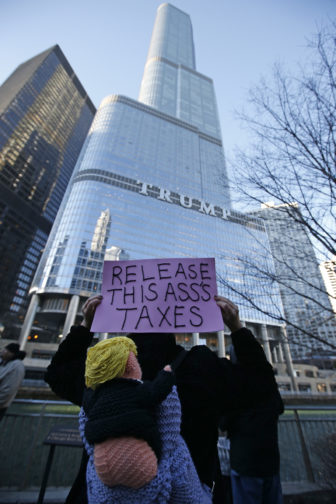
NEW YORK—Donald Trump is Daddy’s Boy. An extensive New York Times investigation of hundreds of thousands of pages of invoices, canceled checks, financial records, some scattered tax returns, property evaluations and more—plus personal interviews with key Trump advisors—shows the Republican president’s wealth actually comes from his late father, real estate magnate Fred Trump. Over the course of his life, the paper estimates Trump received some $414 million in today’s dollars from his father through various income channels, tax schemes, loans, and cash payments.
A lot of that wealth came through deals that played loosely with federal tax laws, both by Fred Trump and Donald. Indeed, the first page of one Donald Trump income tax return in 2005, published last year by the Times, showed a $915 million loss. Trump’s actual taxable wage and salary income that year, the return says, was under $8,000.
The Times investigation, which the Trump White House roundly denounced, blows up Donald Trump’s myth of being a self-made man, aided only by a $1 million loan from his father, which—Trump says—he paid back with interest. Trump spokeswoman Sarah Huckabee Sanders repeated that dodge in an October 3 press conference.
Instead, Fred Trump’s direct loans to Donald, his second-oldest son, were close to $61 million, the Times reported, or $140 million in today’s dollars. Most of them weren’t paid back at all. Most went behind the back of Trump’s sisters and brothers. And the loans were the tip of the Fred Trump financial iceberg.
That iceberg tempted Donald Trump. As his father was declining from dementia, Trump tried to grab even more control of the estate, the Times reported. Fred Trump, however, was still sharp enough then to put a stop to it.
But eventually, Fred Trump found a way to preserve the estate while avoiding estate taxes. He transferred 49.8 percent of his real estate empire to his wife, while he kept 49.8 percent for himself, and distributed 0.4 percent elsewhere. Thus, Fred Trump could claim to be “a minority owner” of the vast amount of real estate and escape later taxes on transfers, especially to his kids.
And those holdings were vastly low-balled, so much so, that after both elder Trumps died, the kids got the $1 billion empire and paid $52.2 million in estate taxes on it—less than one-tenth of what they should have paid at the then-existing 55 percent estate tax rate.
The Times investigation also shows Fred Trump repeatedly bailed Donald out of financial difficulties, including the times younger Trump’s New Jersey casinos went bankrupt. Taxes of less than $100,000 were ever paid on those gifts, which totaled at least $3.35 million. Previously, Donald Trump had stiffed some of the contractors and the workers who built those casinos.

Again in financial trouble after Fred Trump died, Donald Trump, the lead executor of his father’s will, declared to his siblings that the whole empire should be sold. The $1 billion in holdings went for $738 million in May 2004, the Times said, in two sales. The bigger of the two, $707 million, followed low-ball real estate value estimates from a New York City appraiser who frequently deals with high-end clients, especially developers.
Donald Trump used his share of the swag to buy—or buy out—real estate, the Times said. The next month after the empire was sold, Trump bought out his partner’s share of the Trump International Hotel and Tower in Chicago for $73 million, for example.
“I’m just buying it with my own cash,” Trump told reporters. It was really with the cash he got from his father’s estate, the Times said. Trump’s own signed report to the Office of Government Ethics, filed this past May 15, lists two loan liabilities, totaling $75 million-$100 million, he took out to buy the tower at 401 North Wabash Avenue, just north of the Chicago River.
The exact amount is imprecise because the ethics disclosure, required of all federal officials, lets them list the figures in broad categories. One loan, $25 million-$50 million, came from Deutsche Bank. The other loan was $50 million from “Chicago Unit Acquisition LLC”—a limited liability company. Trump lists himself as “member/president” of that firm.
And while the Times story did not say so, Trump also earned $18,498 in condo sales from that 80-story tower, and “over $5 million” in rent. And the LLCs he set up to own the building paid him $3.3 million in management fees, the statement says.
The Times reported that Daddy’s deals still benefit Donald: A Brooklyn housing complex the Trumps invested in around 40 years ago, Starrett City, sold this year for $905 million. The president will net $16 million from his four percent share, through a trust his father established. The ethics statement values Trump’s share of Starrett City as $5 million-$25 million and his annual income from it at $1 million-$5 million.
In his own writings, Trump calls Starrett City “one of the best investments I ever made.”
The full New York Times investigation can be read here.










